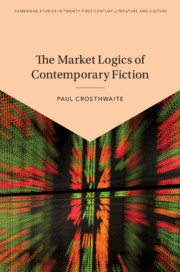Book contents
- The Market Logics of Contemporary Fiction
- Cambridge Studies in Twenty-First-Century Literature and Culture
- The Market Logics of Contemporary Fiction
- Copyright page
- Dedication
- Contents
- Acknowledgements
- Introduction
- Part I The Emergence of Market Metafiction
- Part II The Phantasmagorias of Contemporary Finance
- Part III The Market Knows
- Part IV The Moment of Market Metafiction
- Chapter 6 Putting Everything on the Table
- Chapter 7 Between Autonomy and Heteronomy
- Coda
- Notes
- Index
Coda
Basic Income, or, Why Barbara Browning’s The Gift Is Not a Gift
from Part IV - The Moment of Market Metafiction
Published online by Cambridge University Press: 04 July 2019
- The Market Logics of Contemporary Fiction
- Cambridge Studies in Twenty-First-Century Literature and Culture
- The Market Logics of Contemporary Fiction
- Copyright page
- Dedication
- Contents
- Acknowledgements
- Introduction
- Part I The Emergence of Market Metafiction
- Part II The Phantasmagorias of Contemporary Finance
- Part III The Market Knows
- Part IV The Moment of Market Metafiction
- Chapter 6 Putting Everything on the Table
- Chapter 7 Between Autonomy and Heteronomy
- Coda
- Notes
- Index
Summary
This concluding Coda juxtaposes the market logics traced throughout the book with a form of exchange that is often identified as their antithesis: that of the gift. Focusing on Barbara Browning’s 2017 novel The Gift, it shows how this exemplary work of twenty-first-century market metafiction tries to imagine itself into an alternate economy of gift-giving. The Coda explores the tension, however, whereby the publication of this experimental text, with its Occupy Wall Street affiliations, is made possible by the “gifts” of the corporate and financial donors who support its small, nonprofit press. Rather than viewing this situation as a mere contradiction, however, the Coda suggests that it helps us to recognize that the creation of formally ambitious, “autonomous” works of literary art will always be incompatible with the purity of the gift, since such creation demands material and other resources accessible only via some form of financial backing or remuneration. The Coda suggests that a key challenge for cultural practitioners and critics in the twenty-first century is to imagine a less ends-focused, more democratic structure of support for the arts.
Keywords
- Type
- Chapter
- Information
- The Market Logics of Contemporary Fiction , pp. 256 - 261Publisher: Cambridge University PressPrint publication year: 2019

